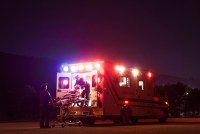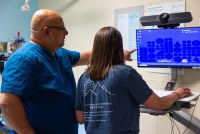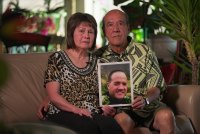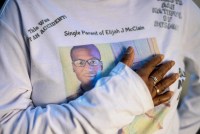Death and Redemption in an American Prison
More than a quarter century after an inmate helped start a hospice program in one of the nation’s most notorious prisons, he is trying to spread the idea.
Hospitales rurales, atrapados en el dilema de sus viejas infraestructuras
El aumento de los costos, en medio de reducciones de los pagos de las aseguradoras, dificulta que los pequeños hospitales obtengan financiación para grandes renovaciones.
Rural Hospitals Are Caught in an Aging-Infrastructure Conundrum
Small, community hospitals face challenges in paying for the capital improvement projects they need to stay open.
As Foundation for ‘Excited Delirium’ Diagnosis Cracks, Fallout Spreads
Major policy changes and disavowals have made this a watershed year for curbing the use of the discredited “excited delirium” diagnosis to explain deaths in police custody. Now the ripple effects are spreading across the country into court cases, state legislation, and police training classes.
Why Do We Pay For so Much Worthless Health Care?
Medical advances are expensive. Take Wegovy, the wildly successful obesity drug that we learned last week may also reduce the risk of heart disease. If just 10 percent of Medicare beneficiaries start taking the drug, taxpayers could be on the hook for nearly $27 billion a year. So how can the country afford the latest […]
Why It’s So Tough to Reduce Unnecessary Medical Care
Treatments that don’t help patients, and may even harm them, are difficult to eliminate because they can be big sources of revenue.
Doctors Abandon a Diagnosis Used to Justify Police Custody Deaths. It Might Live On, Anyway.
The American College of Emergency Physicians agreed to withdraw its 2009 white paper on excited delirium, removing the only official medical pillar of support left for the theory that has played a key role in absolving police of culpability for in-custody deaths.
Police Blame Some Deaths on ‘Excited Delirium.’ ER Docs Consider Pulling the Plug on the Term.
The American College of Emergency Physicians will vote in early October on whether to disavow its 2009 research paper on excited delirium, which has been cited as a cause of death and used as a legal defense by police officers in several high-profile cases.
Pot Boom Wakes Sleepy Dinosaur, Colorado
A small town close to the Colorado-Utah state line strikes it rich with marijuana sales.
A Move to Cut Drug Prices Has Patients With Rare Diseases Worried
A Colorado board has named five drugs it will review for affordability and potential cost caps. But patients with cystic fibrosis worry they will lose access to a life-changing therapy.
Community With High Medical Debt Questions Its Hospitals’ Charity Spending
Pueblo, Colorado, residents have higher-than-average medical debt, while the city’s two tax-exempt hospitals provide relatively low levels of charity care.
A menudo, adolescentes con adicciones pasan por el proceso de desintoxicación sin medicamentos
Una nueva investigación ha descubierto que la mayoría de las áreas de Estados Unidos carecen de instalaciones que ofrezcan desintoxicación supervisada por personal médico para pacientes menores de 18 años.
Teens With Addiction Are Often Left to Detox Without Medication
Facilities that offer medically managed substance use treatment for patients under 18 are few and far between in the United States. A Denver hospital is trying to help fill the gap.
As Nonprofit Hospitals Reap Big Tax Breaks, States Scrutinize Their Required Charity Spending
Nonprofit hospitals avoid paying taxes if they provide community benefits such as charity care. More states are examining that trade-off, scrutinizing the extent of hospitals’ spending on their communities.
At Least 1.7M Americans Use Health Sharing Arrangements, Despite Lack of Protections
A new report boosts the estimated number of people enrolled in plans whose members — usually brought together by shared religious beliefs — pay one another’s health costs.
This Panel Will Decide Whose Medicine to Make Affordable. Its Choice Will Be Tricky.
Colorado’s new Prescription Drug Affordability Board could cap what health plans and consumers pay for certain medications starting next year. The process will pit patient groups against one another.
El dolor, la esperanza y la ciencia chocan cuando los atletas recurren a los hongos mágicos
El uso de hongos psicodélicos está ganando terreno en los Estados Unidos. Investigadores predicen que la FDA aprobará un tratamiento psicodélico en los próximos cinco años.
Pain, Hope, and Science Collide as Athletes Turn to Magic Mushrooms
A group of former professional athletes traveled to Jamaica to try psychedelics as a way to help cope with the aftereffects of concussions and a career of body-pounding injuries. Will this still largely untested treatment work?
States Step In as Telehealth and Clinic Patients Get Blindsided by Hospital Fees
At least eight states have implemented or are considering limits on what patients can be billed for the use of a hospital’s facilities even without having stepped foot in the building.
Los datos de la investigación provienen del estudio Healthy Kids Colorado, una encuesta realizada cada dos años con una muestra aleatoria de 41,000 estudiantes de escuela media y secundaria.























